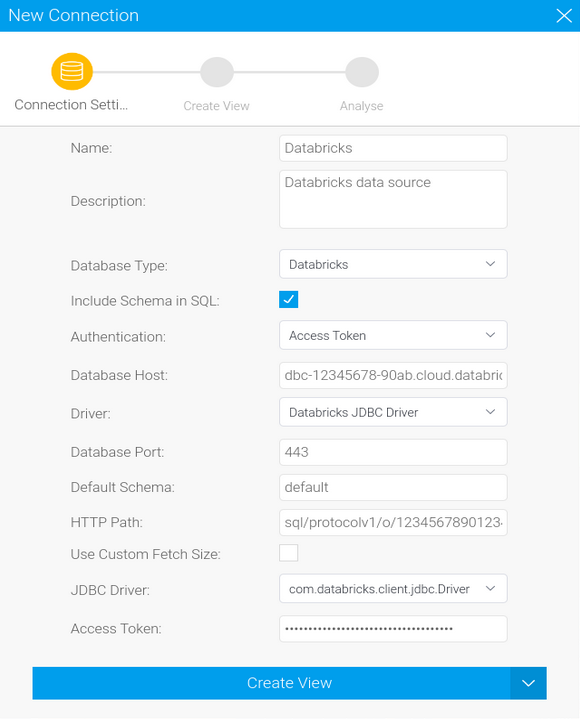Page History
Follow the instructions below to connect Yellowfin to a Databricks database.
- Click on the yellow Create button and choose the data source option.
- Then select the database option.
3. When the New Connection popup appears, provide a name and description for your database.
4. Choose Databricks from the list of available database options. New configuration fields will appear on doing so.
5. Select the Include Schema in SQL checkbox to add the schema name when addressing database tables in SQL queries.
6. Next, select the Authentication method, it is Access Token by default. You can also use Username and Password for authentication, in which case you would need to provide them in the fields below.
7. Enter the name or IP address of the server hosting the Databricks database, as well as the HTTP Path - these details are provided on the Cluster Configuration screen in the JDBC/ODBC section of Advanced options.
8. Select the Use Custom Fetch Size checkbox if you want a specific number of data rows to be retrieved from the database after a query is executed, instead of fetching its entire result. Specify the number of rows in the newly appearing Fetch Size field. This will allow Yellowfin to process data faster.
9. Yellowfin will automatically select the driver to talk to your Databricks database based on the version of the driver you have installed in your Yellowfin instance
10. Enter the API access token or username and password of your Databricks database account.
11. Once you have completed your connection information, you will have several options:
- Advanced Connection Editor: This will take you to the Data Source page in the Admin Console and allow you to edit all the advanced options available for your database.
- Test Connection: This will validate the connection parameters you provided to ensure it can connect to your database. If the connection was successful, a message will appear.
- Create View: This will save your connection and get you started on creating a view based on it.
- Save & Close: This will allow you to save your connection and close the New Connection popup, returning you to the page you were on previously.
- Cancel: This closes the New Connection popup without saving your connection, returning you to the page you were on previously.
12. We recommend testing the connection, and then saving it by using the Save & Close button.



